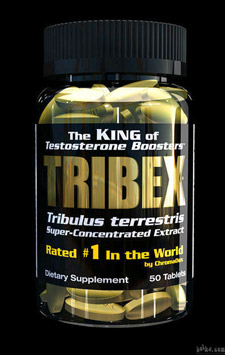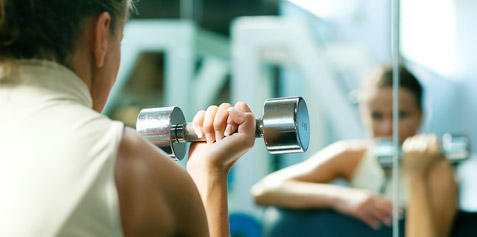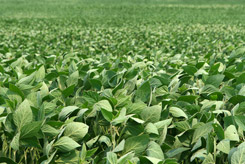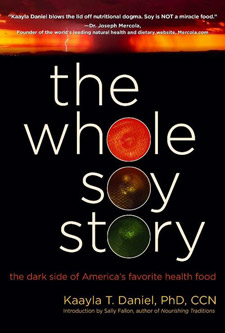Q&A with Mike Furci
10/13/2009
Furci Home / Fitness Channel / Bullz-Eye Home
 Hello,
Hello,
I just happened along your article after ordering two bottles of Alpha Male off the BioTest Web site and immediately cancelled my order. Thank you for mentioning that the ingredient vitex agnus castus could cause such unwanted effects!
I was wondering if there was a tribulus product you felt was effective and safe. Also, is it necessary to take an estrogen blocker, such as 6-OXO, along with a tribulus product? Thank you for your time!
Sincerely,
Joe

 Joe,
Joe,
Tribex Gold from Biotest works well. You can get it from the same Web site you bought Alpha Male from.
I spent hours and hours trying to find the evidence that vitex agnus was beneficial for men to take, and that it had the benefits the manufacturer claims. I found nothing that convinced me it was something a male should take. In fact, I found just the opposite. Alphamale was a great product I took in the past. I e-mailed Biotest, and posted on their forum, asking for the research stating vitex agnus’ benefits. Although they are a good company, they never responded. Unfortunately, I will not take it or recommend it as long as it contains vitex agnus.
Do you need to take an anti-estrogen like 6-OXO? No. Your endogenous testosterone will not go so high while taking Tribex Gold that you’ll be producing too much estrogen. Will taking 6-OXO help reduce your estrogen levels, which does have benefits like increasing your natural testosterone levels? Absolutely.
I would alternate them each month if you’re trying to save money. However, if you can take both at the same time, have at it. They work through different mechanisms.
Mike
 Mike,
Mike,
I’m currently taking a multivitamin because I’m trying to change my health for the better. Is this a good choice? Should I be taking other supplements?
Sergio
 Sergio,
Sergio,
Short answer: no. Multivitamins are a waste because the absorption is so poor. Some vitamins and minerals compete with one another, making absorption even worse.
What I take: Vitamin D (most important) 10,000iu per day; Vitamin A once per week 5000iu; CoQ10 100mg/day; Omega-3 fish oil; conjugated linoleic acid (CLA); and I cook with coconut and olive oils.
I recommend reading my article "Daily Consumption for Optimum Health," and here are a few other websites to consult:
Vitamin D Council
WestonaPrice.org
Vitamin-D-Max.com (this is where I purchase vitamin D)
VitaCost.com (this is where I get Omega-3, CLA and CoQ10.)
TheraBiotics.net (this is where I get my probiotics)
(continued from Sergio):
 Awesome! This is exactly the info I am looking for. I am trying to change my life around, a little at a time. Rather than trying to change a million things at once, I am making changes really slowly so they will stick. For the past year, I have been cooking all my own food for the family, cutting out eating out.
Awesome! This is exactly the info I am looking for. I am trying to change my life around, a little at a time. Rather than trying to change a million things at once, I am making changes really slowly so they will stick. For the past year, I have been cooking all my own food for the family, cutting out eating out.
Thanks for all the advice!
 Sergio,
Sergio,
That’s an excellent game plan. Nothing will affect your health more than what you eat. Remember, it’s what you eat, not how much you eat.
"Everything in Moderation" is another article on things to avoid that will help make good food choices.
 Hi Mike,
Hi Mike,
I read your Q & A from 8/23/06. One of the questions was regarding creatine and weight loss.
I want to build muscle, but I still have some fat to lose. I’m not concerned with overall “weight loss.” just a loss in body fat. I’m currently consuming about 1,200 net calories per day. I’ve only been lifting for about a month and I’m not very strong. I weigh 152 pounds at 5-foot-8, with about 33 percent body fat.
Should I go ahead and start supplementing with creatine now to get stronger, or wait until the fat is gone and I’m actually working on gaining (and eating to gain)?
Also, I should note that I’m vegan and do not get any creatine in my diet. I'm currently supplementing L-L-carnitine and protein.
Thank you,
Victoria F.

 Victoria,
Victoria,
Is the reason you're a vegan a moral one, or do you believe eating any animal products is unhealthy? If it’s a moral one I can understand it. If it’s a health issue, I recommend you start doing some real research. Humans are in no way made or evolved to be vegans. We are physiologically dependent on consuming quality protein from animal sources.
The broad differences in anatomy between man and herbivores are evidence that man did not, and should not, live on a diet high in plant foods, especially those rich in carbohydrates. Humans are carnivorous animals. The Stone Age diet, Dr. Walter Voegtlin challenges, was primarily one of a meat and fat eater. Like the carnivorous dog, our jaws move in a vertical motion. An herbivore’s jaw moves in a rotary fashion. We have canine teeth, and ridged molars and incisors designed for crushing and tearing. Unlike the herbivores that lack canines and have flat molars, mastication is unnecessary and we do not ruminate or chew cud. Our stomachs hold two quarts, empty in about three hours, secrete hydrochloric acid, lack bacteria and cannot digest cellulose. An herbivorous sheep’s stomach holds eight and a half gallons, never empties, digests cellulose, and bacteria are vital to its function. An herbivore’s stomach doesn’t secrete hydrochloric acid, which is primarily for the digestion of protein. Carnivores like man feed intermittently, while herbivores continuously feed (graze). An herbivores digestive tract is five times the size of man’s relative to body size. Unlike herbivores, human colons are short and rectums are small, and do not contribute to digestion. Man’s gall bladder has a vital function and is well developed. The bladder function of an herbivore is weak or nonexistent because of the lack of fat in their diet. The volume of feces from man is small because our digestion efficiency borders on 100 percent. An herbivore’s feces are voluminous because their digestive efficiency is less than or equal to 50 percent, and they must eat large quantities of food.
Being a vegan, despite what you may have been told or read, has several drawbacks nutritionally. I’m going to assume that the protein you take is of a plant origin? And if you’re like many vegans you are probably consuming soy products. Soy is one of the most-processed and unhealthy foods there is.
 We have been led to believe that soy is a health food. However, contained in the United States Food and Drug Administration’s Poisonous Plant Database (which contains references to the scientific literature describing studies of the toxic properties and effects of plants and plant parts) there are 288 records under soy. Several different substances cause the deleterious effects that soy has on our bodies. I’m just going to go over a few for you.
We have been led to believe that soy is a health food. However, contained in the United States Food and Drug Administration’s Poisonous Plant Database (which contains references to the scientific literature describing studies of the toxic properties and effects of plants and plant parts) there are 288 records under soy. Several different substances cause the deleterious effects that soy has on our bodies. I’m just going to go over a few for you.
One of the substances contained in soybeans, which remains in soy products like protein, is goitrogens. These are naturally occurring and interfere with the function of the thyroid gland. Goitrogens get their name from the term “goiter,” which means enlargement of the thyroid gland. Thirty grams of soy protein per day – about three tablespoons – has been shown to disrupt and slow thyroid function. Thyroid disease is rampant in Asian societies and is increasing in the U.S.
Foods that contain goitrogens include broccoli, cabbage, mustard, peanuts, turnips, brussels sprouts and others. However, unlike soy, cooking or fermentation easily neutralizes the goitrogens in these foods. Heat, pressure or alkaline solutions used to process soy neither deactivates nor removes goitrogens from soy end products. They are virtually in all soy foods; the highest concentration being in products that are not fermented, like tofu, modern soy sauce, baby formula and -- you guessed it -- protein.
Another nasty substance contained in soy protein and other products that can inflict damage on your body are phytoestrogens. Isoflavones are examples of phytoestrogens and are in many plants, with the highest concentration being in soybeans. Phytoestrogens, although not hormones, are very similar and can bind to estrogen receptor sites and have been shown to cause negative effects.
Do yourself a favor and read the “Whole Soy Story” by Kaayla Daniel. Do not succumb to the soy industry’s ad campaigns and some in the supplement industry that claim soy protein is on equal ground with protein derived from milk. It’s not even close. The only reason companies use this garbage is simply because it’s inexpensive, not because of its quality.
The more quality protein you eat, the more fat you burn as fuel. Protein consumption is directly related to thermo-genesis and satiety through multiple mechanisms. A plant-based diet is in conflict with your goals.
And to answer your creatine question, I wouldn’t start to take it yet. Get a good six months to a year of lifting under your belt. You’re just not going to benefit as a novice lifter. Being a vegan, creatine is not your only worry as far as deficiency goes. For instance, the only Vitamin B12 available in plant form is an analog and does nothing for humans.
You’re not going to get much from the supplement L-carnitine. You’d be better off using an Omega-3 supplement. Read Daily Consumption.
Like I said, if you have a moral dilemma with eating animal-based protein I can respect that, but hopefully for our goals and overall health, you might want to try milk-based proteins to supplement with.
Good luck,
Mike
(continued from Victoria):
 Hi Mike, thank you so much for taking the time to reply to me.
Hi Mike, thank you so much for taking the time to reply to me.
I’m vegan because it is ethically the right choice for me personally. I know there are arguments for and against veganism as it relates to health, and both sides show evidence to support their claims. I’m not here to argue about the pros or cons of veganism -- that’s just not my thing. It’s my choice. I don’t care if we’re not meant to be vegan. I don’t think of soy as health food, it’s just a necessary part of my diet. No one will ever convince me to eat animal products, and I’m not trying to get anyone not to eat them. More importantly, it’s not the point here. I only mentioned it as it related to the specific question I asked.
If you have a chance, would you please elaborate on the answer you gave to my question? I would like to understand why a novice would not benefit from creatine, and also why you think L-carnitine isn’t helpful to me. I am already supplementing Omega-3 and B-12.
I really appreciate your advice and am looking forward to your response. Thank you again for your time.
Victoria F.

 Victoria,
Victoria,
I respect your decision to be a vegan. You’re doing what you believe is the right choice ethically without imposing on others. We need more like you. I would never try to convince somebody like yourself to eat animal products; however I do feel it is my obligation to educate people when it concerns their health.
Before I get to creatine and L-carnitine, I am asking that you start to educate yourself about soy consumption. Soy is one of the worst foods you can consume. Soy’s effects are in direct opposition to what you’re trying to accomplish. “The Whole Soy Story,” will at least show you what products are the least harmful. You must remember, however, that even the fermented varieties of soy, which have the least amount of anti-nutrients, are not made the same way they were for centuries in Asian communities. Please be careful.
Carnitine is one of those supplements that have been shown to mobilize fat for fuel. However, this is to such a small degree it is truly a waste to consume. Omega-3s, which are also one of the healthiest substances you can consume, are much more effective than carnitine. O-3s also work by curbing your appetite. Take O-3s with every meal and make sure to get at least 3 to 4 grams per day; take more if you can afford it.
Creatine is one of the most-studied sports supplements, and is truly a fantastic substance. Is it going to hurt you to take it as a novice? Absolutely not. Will it help? It may. However, it is important to get solid basics before adding in extras. Your goal is to build muscle and lose fat. What burns fat as fuel? Muscle.
Muscle drives the metabolism. The more muscle you have the faster your metabolism is. To build muscle you need to get stronger, period. It’s that simple. Yet legions of people fail at this daily, monthly and yearly, despite -- in many cases -- taking supplements. One must learn how to train to create the exact stimulus necessary to elicit an adaptive response. This stimulus is intensity. Only when a muscle is contracting with the greatest possible force can there be maximum intensity, which elicits the maximum adaptive response.
Training with intensity is a learned skill. Creatine will help you gain strength and muscle only if you’re training and recovering properly, and creatine’s efficacy is a result of proper training. I do not recommend any supplements to a novice except quality protein, which is a prerequisite for building muscle and good health.
I hope this helps.
Mike
(continued from Victoria):
 Dear Mike,
Dear Mike,
Thank you! That was a very nice e-mail, and very helpful.
I’m trying to be open minded about your advice to incorporate milk protein into my diet, but at the moment I’m having trouble getting past my aversion to dairy products. I’m going to give it some serious consideration, and I intend to further investigate what you’re telling me about soy. I’m glad you brought these things to my attention.
Thank you again; I really appreciate your time and insight.
Victoria
You can follow us on Twitter and Facebook for content updates. Also, sign up for our email list for weekly updates and check us out on Google+ as well.













